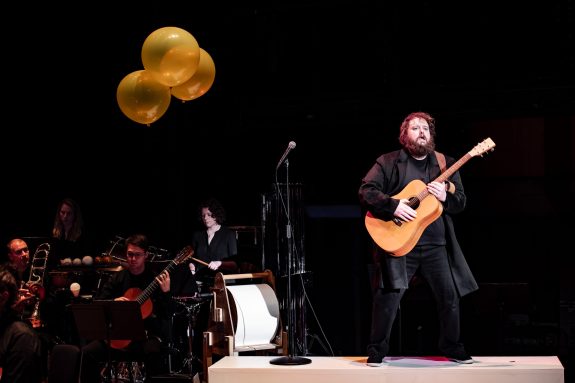 United Kingdom Schubert: Allan Clayton (tenor), Aurora Orchestra / Nicholas Collon (conductor). Queen Elizabeth Hall, London, 14.3.2024. (AK)
United Kingdom Schubert: Allan Clayton (tenor), Aurora Orchestra / Nicholas Collon (conductor). Queen Elizabeth Hall, London, 14.3.2024. (AK)

Schubert (arr. Hans Zender) – Winterreise
Concept and Direction – Jane Mitchell
Co-director – Allan Clayton
It was with some trepidation as well as joyful anticipation with what I was looking forward to this performance. Schubert’s Winterreise, composed in 1827 to poems by Wilhelm Müller, could be regarded as sacrosanct. The 24-song cycle describes the thoughts of a young man who was dejected in love but arguably it is also a farewell to life which the very ill Schubert composed a year before his death. Whatever the meaning, this cycle for voice and piano is one of the great masterpieces of the canon.
In 1993, German composer Hans Zender offered his impression of the cycle in his ‘Schubert’s Winterreise – A Composed Interpretation’. Zender seems to leave Schubert’s vocal line intact – there might be some melodic changes which I did not notice, and there is some Sprechstimme which I did notice – but he re-imagines the soundscape for the accompaniment which he extends by about half an hour. Schubert’s piano introduction to the first song (Gute Nacht) is six bars long; Zender’s orchestral introduction to the same song is about three minutes. The length of orchestral extension varies from song to song, depending on the text of the each one.
The instruments used by Zender include strings, wind, brass, harp, timpani and percussion but also melodicas, a saxophone, guitar, an accordion as well as a wind machine. Furthermore, the use of instruments creates further variety of sounds. At this concert, the introduction to the first song started with the timpani player very slowly and very gently moving the palm of his hand on his instrument. The sound was barely audible but gradually increased and was joined by the string players adding col legno and pizzicato to the slowly emerging soundscape of the snow. Zender’s use of instrumentation and of his individual instruments is not haphazard: he chooses any combination of his instruments according to how he interprets Wilhelm Müller’s poems (and Schubert’s response to them).
Zender suggested some stage direction to some of his players, such as walking slowly while playing their instruments. I have not yet seen his score but I guess that Zender might have wanted additional sound effects by such instructions.
I am uncertain which stage direction came from Zender and which from co-directors Jane Mitchell and Allan Clayton in this production. However, what I experienced was 90 minutes of exciting theatre. There was no interval during the performance and latecomers were not allowed in. For ninety fascinating minutes we experienced, almost lived through, the painful journey of Schubert’s lonely protagonist (or of Schubert himself).

Tenor (and here co-director) Allan Clayton is astonishing beyond words. I have long admired the purity and integrity of his singing, but this time he was on the stage for entire time portraying text and music by facial expressions, walking (on stage and at one point in the auditorium), crawling, sitting, lying down, giving an Elvis impersonation with a guitar, dancing, and fading out of life on conclusion. Clayton would have been deeply moving even if he did not sing a single note. But he also sang Schubert’s demanding cycle, with his customary artistic intelligence and integrity.
I am not sure about the stage design and lighting, there was so much going on. All I can say is that the overall impression was a great theatrical experience which included the staging, lighting and video projection. I am certain that these elements must have been, up to a point, dictated by restrictions on the Queen Elizabeth Hall concert stage. I would love to see this whole production in a small theatre, even if we would lose walking in the auditorium (which the tenor as well as members of the orchestra did at one point).
Surely the Aurora Orchestra is unique nationwide and worldwide. They play their instruments to a high standard, they play mostly from memory and, in this production, they convincingly act as, for instance, the villagers, the postman and even the crows along the journey. While playing their instruments, they walk on stage, they walk in the auditorium, they sit, kneel, throw snowflakes and are wholly integral to the theatrical experience. Their founder conductor, Nicholas Collon, raised the bar high for other groups to try to follow this versatility. In the meantime, Collon and his Aurora present music at its best.
Agnes Kory
